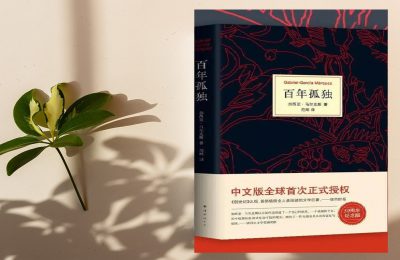《百年孤独》,是哥伦比亚作家加西亚·马尔克斯创作的长篇小说,是其代表作,也是拉丁美洲魔幻现实主义文学的代表作,被誉为“再现拉丁美洲历史社会图景的鸿篇巨著”。故事讲述马孔多小镇和布恩地亚家族的兴衰变化与传奇故事,记录了家族命运与百年历史,是重复地叙述相同而荒唐的命运,是拉美国家几百年命运的缩影,独具意味地隐喻着人类“文明”史的建立、发展与终结,在荒凉失落与荒唐可笑中诠释宿命式的轮回。家族中人物名字是相同或相近的,预示着他们拥有殊途同归的孤独命运。《百年孤独》以布恩地亚被捆在树上为开端,以他被蚂蚁吃掉为结束,通过细腻丰富的笔触、大胆自由的想象、魔幻的叙事艺术,讲述布恩地亚家族命运与历史,刻画人物孤独的灵魂与自我救赎,进而体现出个人、家族及全人类的悲悯与孤独情怀,让人们重新思考时代发展与人性变化。《百年孤独》被世界文坛誉为魔幻现实主义文学的主峰,已被翻译成30多种文字出版,销量逾1000万册。
Chapter 4
THE NEW HOUSE, white, like a dove, was inaugurated with a dance. ?rsula had got that idea from the afternoon when she saw Rebeca and Amaranta changed into adolescents, and it could almost have been said that the main reason behind the construction was a desire to have a proper place for the girls to receive visitors. In order that nothing would be lacking in splendor she worked like a galley slave as the repairs were under way, so that before they were finished she had ordered costly necessities for the decorations, the table service, and the marvelous invention that was to arouse the astonishment of the town and the jubilation of the young people: the pianola. They delivered it broken down, packed in several boxes that were unloaded along with the Viennese furniture, the Bohemian crystal, the table service from the Indies Company, the tablecloths from Holland, and a rich variety of lamps and candlesticks, hangings and drapes. The import house sent along at its own expense an Italian expert, Pietro Crespi, to assemble and tune the pianola, to instruct the purchasers in its functioning, and to teach them how to dance the latest music printed on its six paper rolls.
Pietro Crespi was young and blond, the most handsome and well mannered man who had ever been seen in Macondo, so scrupulous in his dress that in spite of the suffocating heat he would work in his brocade vest and heavy coat of dark cloth. Soaked in sweat, keeping a reverent distance from the owners of the house, he spent several weeks shut up is the parlor with a dedication much like that of Aureliano in his silverwork. One morning, without opening the door, without calling anyone to witness the miracle, he placed the first roll in the pianola and the tormenting hammering and the constant noise of wooden lathings ceased in a silence that was startled at the order and neatness of the music. They all ran to the parlor. Jos?Arcadio Buendía was as if struck by lightning, not because of the beauty of the melody, but because of the automatic working of the keys of the pianola, and he set up Melquíades?camera with the hope of getting a daguerreotype of the invisible player. That day the Italian had lunch with them. Rebeca and Amaranta, serving the table, were intimidated by the way in which the angelic man with pale and ringless hands manipulated the utensils. In the living room, next to the parlor, Pietro Crespi taught them how to dance. He showed them the steps without touching them, keeping time with a metronome, under the friendly eye of ?rsula, who did not leave the room for a moment while her daughters had their lesson. Pietro Crespi wore special pants on those days, very elastic and tight, and dancing slippers, “You don’t have to worry so much,?Jos?Arcadio Buendía told her. “The man’s a fairy.?But she did not leave off her vigilance until the apprenticeship was over and the Italian left Macondo. Then they began to organize the party. ?rsula drew up a strict guest list, in which the only ones invited were the descendants of the founders, except for the family of Pilar Ternera, who by then had had two more children by unknown fathers. It was truly a high-class list, except that it was determined by feelings of friendship, for those favored were not only the oldest friends of Jos?Arcadio Buendía’s house since before they undertook the exodus and the founding of Macondo, but also their sons and grandsons, who were the constant companions of Aureliano and Arcadio since infancy, and their daughters, who were the only ones who visited the house to embroider with Rebeca and Amaranta. Don Apolinar Moscote, the benevolent ruler whose activity had been reduced to the maintenance from his scanty resources of two policemen armed with wooden clubs, was a figurehead. In older to support the household expenses his daughters had opened a sewing shop, where they made felt flowers as well as guava delicacies, and wrote love notes to order. But in spite of being modest and hard-working, the most beautiful girls in Iowa, and the most skilled at the new dances, they did not manage to be considered for the party.
